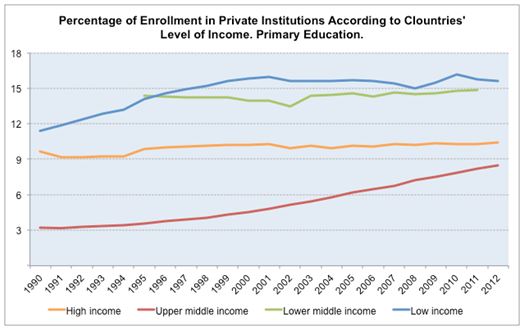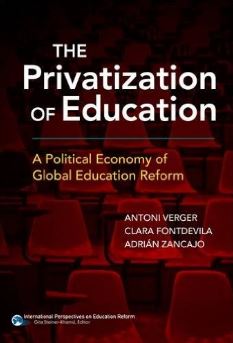The Privatisation of Education: a Global Phenomenon with Multiple Faces by Antoni Verger, Clara Fontdevila and Adrián Zancajo
By Antoni Verger, Clara Fontdevila and Adrián Zancajo, Universitat Autònoma de Barcelona.
 Education privatisation has become an important topic in the global education agenda, particularly in the context of Southern countries, where this phenomenon is increasing rapidly. Among the most emblematic policies promoting the involvement of the private sector are charter schools, voucher schemes, the contracting out of private schools, or the promotion of low fee private schools. These policy solutions advance under different rationales. They are usually presented as a way to expand access to education efficiently, but also as a way to increase the quality of the education system, foster innovation and/or promote education diversification. However a broad range of scholars, civil society groups, teachers’ unions and international organizations are expressing their concern about the possible negative effects on the right to education and inequalities of these kind of policies. In spite of this debate between advocates and critics, the fact is that the enrolment in private schools has experienced a significant and constant growth in the last years, particularly in low and middle-income countries (see figure below).
Education privatisation has become an important topic in the global education agenda, particularly in the context of Southern countries, where this phenomenon is increasing rapidly. Among the most emblematic policies promoting the involvement of the private sector are charter schools, voucher schemes, the contracting out of private schools, or the promotion of low fee private schools. These policy solutions advance under different rationales. They are usually presented as a way to expand access to education efficiently, but also as a way to increase the quality of the education system, foster innovation and/or promote education diversification. However a broad range of scholars, civil society groups, teachers’ unions and international organizations are expressing their concern about the possible negative effects on the right to education and inequalities of these kind of policies. In spite of this debate between advocates and critics, the fact is that the enrolment in private schools has experienced a significant and constant growth in the last years, particularly in low and middle-income countries (see figure below).

Although there is a common trend towards more involvement of private actors in education worldwide, education privatisation is not a monolithic process. The analysis of the processes of education privatization worldwide shows how national and sub-national governments are engaging with these policies for very different political, economic and/or social reasons, and in very different circumstances. Specifically, following a systematic literature review on the political economy of education privatisation (involving the review and synthesis of 227 studies), which we have published recently with Teachers College Press, we have identified that there are at least six different paths toward education privatisation. These different patterns (or clusters of frequently associated actors, mechanisms, and economic, political and social circumstances) clearly reflect such diversity of processes, and are illustrated with their most paradigmatic cases:
- Reshaping the role of the state in education (UK[i] and Chile).Drastic privatization process as part of a structural state reform adopted by neoliberal governments in the 1980s and consolidated by New Labor administrations resulting in a quasi-market system where the role of the state focuses on the regulation and distribution of incentives.
- Education privatization in socio-democratic welfare states (Sweden, Denmark, Norway). Introduction of a wide range of market reforms (from ambitious voucher systems to mild school choice programs), framed as part of a necessary modernization of the welfare state, and with the proactive collaboration of social-democratic forces usually less inclined to promote competition as an end in itself but willing to respond to middle-class demand for diversification.
- Scaling-up privatization (US, Colombia).Uneven but progressive alteration of the system through the authorization and encouragement of new forms of provision and management such as charter schools, under the principle of school choice and with the key contribution of non-state actors (think tanks, grassroots movements) forming loose advocacy coalitions.
- De facto privatization in low-income countries (Ghana, India, Kenya, Malawi, Nigeria, Pakistan and Peru). Expansion of low-fee private schools originally set up by local edu-preneurs responding to a growing education demand, but increasingly promoted by the international development community and supported by national governments as part of public-private-partnership (PPP) schemes.
- Historical PPPs (The Netherlands, Belgium and Spain). Countries with a longstanding presence of private, faith-based schools have incorporated these schools in the state network during the expansion of the education system in the 20th century as a means to achieve a state-church compromise rather than on ideological (neoliberal) grounds. As a result of this historical process, the presence of private subsidized schools, mainly managed by faith-based institutions, is high in primary and secondary education.
- Privatization by way of catastrophes (New Orleans, El Salvador, Haiti and Iraq). Rapid advancement of education privatization catalyzed by natural disasters or violent conflicts, skillfully conceived and framed by privatization advocates as an opportunity to reconstruct the system and in a context where the sense of urgency justifies the temporary suspension of the democratic deliberative process and a reduction of veto opportunities.
Overall, education privatization is a global phenomenon affecting countries regardless of their income level, but is far from translating into a homogeneous set of policy outcomes and processes. The different paths described above show how education privatization is adopted for different reasons and crystallizes in very different policy arrangements depending on political, economic and social factors. Existing literature on the topic shows how material factors (such as economic crisis, budgetary restrictions, or humanitarian crisis) but also factors of an ideational nature (such as the legitimacy crisis of the welfare state, the hegemony of the neoliberal paradigm in the political sphere, or the “public education in crisis” frame) have an important role in promoting privatization policies and as a drivers of their political adoption. In addition, privatisation processes appear to be the result of a complex interplay of global and local forces. While changes at a global scale (including economic recessions or the spread of the neoliberal doctrine) have a crucial impact in the advance of education privatisation, factors of a more domestic or situated nature are also importantly at play. Elements such as the welfare-state tradition or the ideology of the government in power inevitably condition the scope and nature of the privatisation processes embraced by different countries.
Challenging education privatization as a global project
Nowadays, education privatization represents one of the most important challenges for national education systems, and has major implications for the governance, organisation and access to education worldwide. The expansion of market-oriented policies, together with recent changes in contemporary social structures, favour the expansion of consumerist values in education, and the increasing conception of education as a form of social distinction. Ultimately, the commodification of education contributes to increasing the tension between the individual and the social goals of education (with the latter including the acquisition of a common culture and the promotion of social cohesion), and promotes the segmentation and hierarchization of education systems.
Currently, a broader range of political forces and social groups – that go beyond the traditional conservative parties and the middle and upper classes – accept and promote private sector participation in education. This “private education consent” is actively and effectively manufactured by influential international actors and advocacy coalitions. The hegemonic dimension that education privatization is acquiring explains, to some extent, the expansion of private education globally. Furthermore, despite privatisation reforms rarely going unchallenged, responses against privatization reforms have met with uneven success so far. Understanding how and why education privatization happens is a first and necessary step to organize better-articulated and more meaningful responses to this global trend.
[i] Although we use the denomination United Kingdom, the literature analyzed mainly focuses on the cases of England and Wales.
Antoni Verger is senior researcher at the Department of Sociology of the Universitat Autònoma de Barcelona. His main areas of expertise are global governance and education reform. Email: tverger@gmail.com
Clara Fontdevila is a PhD candidate at the Department of Sociology of Universitat Autònoma de Barcelona. Her research focuses on private-sector engagement in education and the global governance of education. Email: clara.fontdevila@gmail.com
Adrián Zancajo is a PhD candidate in sociology at Universitat Autònoma de Barcelona. His main areas of research are education privatization policies and educational inequalities. Email: adrian.zancajo@gmail.com
Further Reading:
 Verger, A., Fontdevila, C. and Zancajo, A. (2016) The Privatization of Education: A Political Economy of Global Education Reform. International Perspectives on Educational Reform. Teachers College Press.
Verger, A., Fontdevila, C. and Zancajo, A. (2016) The Privatization of Education: A Political Economy of Global Education Reform. International Perspectives on Educational Reform. Teachers College Press.
Related NORRAG Blogs:
˃˃ Blogs about low-fee private schools and non-state actors in education
NORRAG (Network for International Policies and Cooperation in Education and Training) is an internationally recognised, multi-stakeholder network which has been seeking to inform, challenge and influence international education and training policies and cooperation for almost 30 years. NORRAG has more than 4,500 registered members worldwide and is free to join. Not a member? Join free here.

Pingback : Taming Educational Privatization | NORRAG NEWSBite
Pingback : Norrag Taming Educational Privatization - Norrag